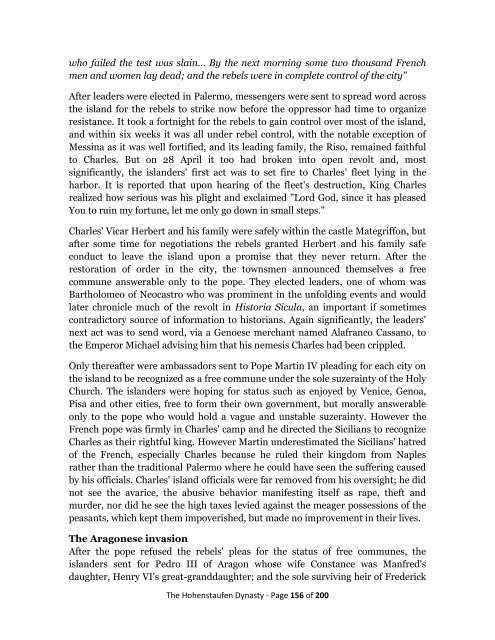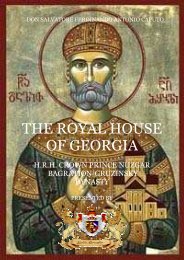here - Nobility Associations
here - Nobility Associations
here - Nobility Associations
Create successful ePaper yourself
Turn your PDF publications into a flip-book with our unique Google optimized e-Paper software.
who failed the test was slain… By the next morning some two thousand French<br />
men and women lay dead; and the rebels were in complete control of the city”<br />
After leaders were elected in Palermo, messengers were sent to spread word across<br />
the island for the rebels to strike now before the oppressor had time to organize<br />
resistance. It took a fortnight for the rebels to gain control over most of the island,<br />
and within six weeks it was all under rebel control, with the notable exception of<br />
Messina as it was well fortified, and its leading family, the Riso, remained faithful<br />
to Charles. But on 28 April it too had broken into open revolt and, most<br />
significantly, the islanders' first act was to set fire to Charles' fleet lying in the<br />
harbor. It is reported that upon hearing of the fleet's destruction, King Charles<br />
realized how serious was his plight and exclaimed "Lord God, since it has pleased<br />
You to ruin my fortune, let me only go down in small steps."<br />
Charles' Vicar Herbert and his family were safely within the castle Mategriffon, but<br />
after some time for negotiations the rebels granted Herbert and his family safe<br />
conduct to leave the island upon a promise that they never return. After the<br />
restoration of order in the city, the townsmen announced themselves a free<br />
commune answerable only to the pope. They elected leaders, one of whom was<br />
Bartholomeo of Neocastro who was prominent in the unfolding events and would<br />
later chronicle much of the revolt in Historia Sicula, an important if sometimes<br />
contradictory source of information to historians. Again significantly, the leaders'<br />
next act was to send word, via a Genoese merchant named Alafranco Cassano, to<br />
the Emperor Michael advising him that his nemesis Charles had been crippled.<br />
Only t<strong>here</strong>after were ambassadors sent to Pope Martin IV pleading for each city on<br />
the island to be recognized as a free commune under the sole suzerainty of the Holy<br />
Church. The islanders were hoping for status such as enjoyed by Venice, Genoa,<br />
Pisa and other cities, free to form their own government, but morally answerable<br />
only to the pope who would hold a vague and unstable suzerainty. However the<br />
French pope was firmly in Charles' camp and he directed the Sicilians to recognize<br />
Charles as their rightful king. However Martin underestimated the Sicilians' hatred<br />
of the French, especially Charles because he ruled their kingdom from Naples<br />
rather than the traditional Palermo w<strong>here</strong> he could have seen the suffering caused<br />
by his officials. Charles' island officials were far removed from his oversight; he did<br />
not see the avarice, the abusive behavior manifesting itself as rape, theft and<br />
murder, nor did he see the high taxes levied against the meager possessions of the<br />
peasants, which kept them impoverished, but made no improvement in their lives.<br />
The Aragonese invasion<br />
After the pope refused the rebels' pleas for the status of free communes, the<br />
islanders sent for Pedro III of Aragon whose wife Constance was Manfred's<br />
daughter, Henry VI's great-granddaughter; and the sole surviving heir of Frederick<br />
The Hohenstaufen Dynasty - Page 156 of 200



